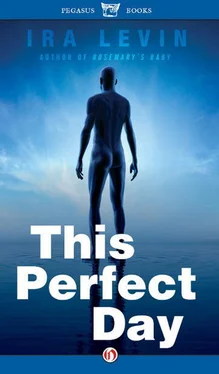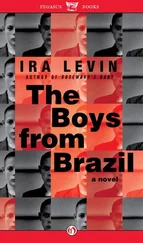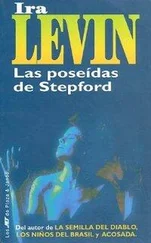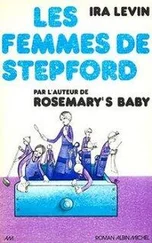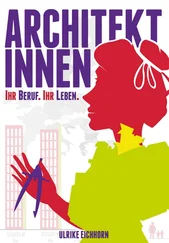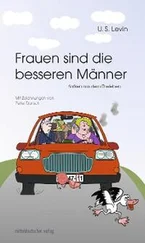One afternoon Karl came into Chip’s cubicle and stood beside the desk with his hands fisted at his sides. Chip, looking up at him, thought he had been stricken by a fever or worse; his face was flushed and his eyes were narrowed in a strange stare. But no, it was anger that held him, anger such as Chip had never seen before, anger so intense that, trying to speak, Karl seemed unable to work his lips.
Anxiously Chip said, “What is it?”
“Li,” Karl said. “Listen. Will you do me a favor?”
“Sure! Of course!”
Karl leaned close to him and whispered, “Claim a pad for me, will you? I just claimed one and was denied. Five fighting hundred of them, a pile this high, and I had to turn it back in!”
Chip stared at him.
“Claim one, will you?” Karl said. “Anyone can try a little sketching in his spare time, right? Go on down, okay?”
Painfully Chip said, “Karl—”
Karl looked at him, his anger retreated, and he stood up straight. “No,” he said. “No, I—I just lost my temper, that’s all. I’m sorry. I’m sorry, brother. Forget it.” He clapped Chip’s shoulder. “I’m okay now,” he said. “I’ll claim again in a week or so. Been doing too much drawing anyway, I suppose. Uni knows best.” He went off down the aisle toward the bathroom.
Chip turned back to the desk and leaned on his elbows and held his head, shaking.
That was Tuesday. Chip’s weekly adviser meetings were on Woodsday mornings at 10:40, and this time he would tell Li YB about Karl’s sickness. There was no longer any question of being an alarmist; there was faulted responsibility, in fact, in having waited as long as he had. He ought to have said something at the first clear sign, Karl’s slipping out of TV (to draw, of course), or even when he had noticed the unusual look in Karl’s eyes. Why in hate had he waited? He could hear Li YB gently reproaching him: “You haven’t been a very good brother’s keeper, Li.”
Early on Woodsday morning, though, he decided to pick up some coveralls and the new Geneticist. He went down to the supply center and walked through the aisles. He took a Geneticist and a pack of coveralls and walked some more and came to the art-supplies section. He saw the pile of green-covered sketch pads; there weren’t five hundred of them, but there were seventy or eighty and no one seemed in a rush to claim them.
He walked away, thinking that he must be going out of his mind. Yet if Karl were to promise not to draw when he wasn’t supposed to…
He walked back again —“Anyone can try a little sketching in his spare time, right?”— and took a pad and a packet of charcoal. He went to the shortest check-out line, his heart pounding in his chest, his arms trembling. He drew a deep-as-possible breath; another, and another.
He put his bracelet to the scanner, and the stickers of the coveralls, the Geneticist, the pad, and the charcoal. Everything was yes. He gave way to the next member.
He went back up to the dorm. Karl’s cubicle was empty, the bed unmade. He went into his own cubicle and put the coveralls on the shelf and the Geneticist on the desk. On the top page of the pad he wrote, his hand still trembling, Free time only. I want your promise. Then he put the pad and the charcoal on his bed and sat at the desk and looked at the Geneticist.
Karl came, and went into his cubicle and began making his bed. “Are those yours?” Chip asked.
Karl looked at the pad and charcoal on Chip’s bed. Chip said, “They’re not mine.”
“Oh, yes. Thanks,” Karl said, and came over and took them. “Thanks a lot,” he said.
“You ought to put your nameber on the first page,” Chip said, “if you’re going to leave it all over like that.”
Karl went into his cubicle, opened the pad, and looked at the first page. He looked at Chip, nodded, raised his right hand, and mouthed, “Love of Family.”
They rode down to the classrooms together. “What did you have to waste a page for?” Karl said.
Chip smiled.
“I’m not joking,” Karl said. “Didn’t you ever hear of writing a note on a piece of scrap paper?”
“Christ, Marx, Wood, and Wei,” Chip said.
In December of that year, 152, came the appalling news of the Gray Death, sweeping through all the Mars colonies except one and completely wiping them out in nine short days. In the Academy of the Genetic Sciences, as in all the Family’s establishments, there was helpless silence, then mourning, and then a massive determination to help the Family overcome the staggering setback it had suffered. Everyone worked harder and longer. Free time was halved; there were classes on Sundays and only a half-day Christmas holiday. Genetics alone could breed new strengths in the coming generations; everyone was in a hurry to finish his training and get on to his first real assignment. On every wall were the white-on-black posters: MARS AGAIN!
The new spirit lasted several months. Not until Marxmas was there a full day’s holiday, and then no one quite knew what to do with it. Chip and Karl and their girlfriends rowed out to one of the islands in the Amusement Gardens lake and sunbathed on a large flat rock. Karl drew his girlfriend’s picture. It was the first time, as far as Chip knew, that he had drawn a living human being.
In June, Chip claimed another pad for Karl.
Their training ended, five weeks early, and they received their assignments: Chip to a viral genetics research laboratory in USA90058; Karl to the Institute of Enzymology in JAP50319.
On the evening before they were to leave the Academy they packed their take-along kits. Karl pulled green-covered pads from his desk drawers—a dozen from one drawer, half a dozen from another, more pads from other drawers; he threw them into a pile on his bed. “You’re never going to get those all into your kit,” Chip said.
“I’m not planning to,” Karl said. “They’re done; I don’t need them.” He sat on the bed and leafed through one of the pads, tore out one drawing and another.
“May I have some?” Chip asked.
“Sure,” Karl said, and tossed a pad over to him.
It was mostly Pre-U Museum sketches. Chip took out one of a man in chain mail holding a crossbow to his shoulder, and another of an ape scratching himself.
Karl gathered most of the pads and went off down the aisle toward the chute. Chip put the pad on Karl’s bed and picked up another one.
In it were a nude man and woman standing in parkland outside a blank-slabbed city. They were taller than normal, beautiful and strangely dignified. The woman was quite different from the man, not only genitally but also in her longer hair, protrusive breasts, and overall softer convexity. It was a great drawing, but something about it disturbed Chip, he didn’t know what.
He turned to other pages, other men and women; the pictures grew surer and stronger, done with fewer and bolder lines. They were the best drawings Karl had ever made, but in each there was that disturbing something, a lack, an imbalance that Chip was at a loss to define.
It hit him with a chill.
They had no bracelets.
He looked through to check, his stomach knotting sick-tight. No bracelets. No bracelets on any of them. And there was no chance of the drawings being unfinished; in the corner of each of them was an A with a circle around it.
He put down the pad and went and sat on his bed; watched as Karl came back and gathered the rest of the pads and, with a smile, carried them off.
There was a dance in the lounge but it was brief and subdued because of Mars. Later Chip went with his girlfriend into her cubicle. “What’s the matter?” she asked.
“Nothing,” he said.
Читать дальше
